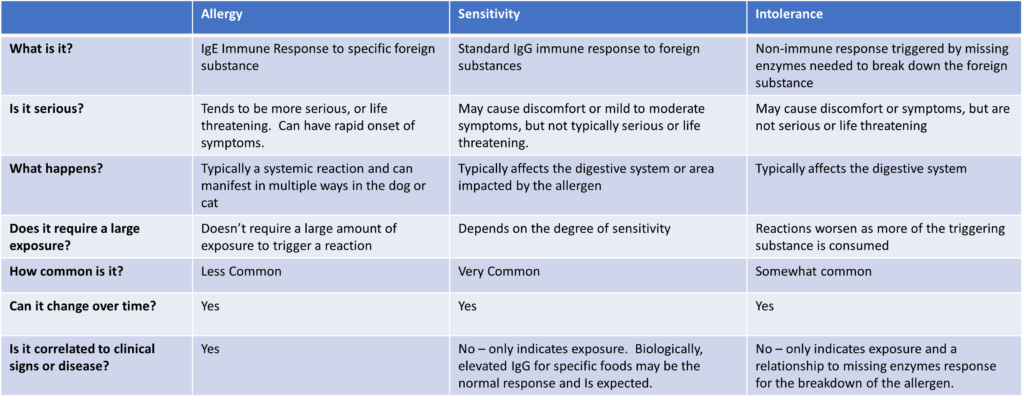Allergy Testing
Allergy vs Intolerance vs Sensitivity
The primary difference between an allergy, a sensitivity, and an intolerance is that an allergy results in an immune system reaction to a substance, while a sensitivity or intolerance involves no immune response. While the later may result in occasional discomfort for your pet, they are typically not the significant kind of immune response that may occur with allergies. VDI’s Allergy Panels test for true allergies.

Allergy
Although the word “Allergy” is colloquially used to describe any reaction to a foreign substance, it’s not wholly accurate. A true allergy describes a reaction produced when the body meets a normally harmless substance, which has been “remembered” from a previous exposure and subsequently produces the “IgE” antibody.
In order for an allergy to develop, a pet must be exposed to the substance at least once before the allergy will manifest. The immune system learns to attack this particular substance for an unknown reason, at which point the immune response will go into hyperdrive to attack it – resulting in elevated IgE levels.
Sensitivity
A sensitivity is a delayed immune reaction resulting in the production of “IgG” antibody to a foreign substance, typically food. Though they may cause some clinical signs this type of reaction is not an allergic reaction and does not carry the same seriousness as a true allergy.
IgG testing for sensitivity is readily available however it has not been correlated to clinical signs or disease, given that IgG response is the body’s natural response to consuming any foreign substance and is expected. Additional IgG testing has been shown to produce several “positives” which may lead to over-restriction of the diet.
Concerningly, patients with food intolerances acting on the results of IgG panels may see improvements because the large number of foods they must eliminate may remove the culprit from their diet by coincidence. However, over-restriction can have impacts as it may place a patient at risk of nutritional deficiencies.
Intolerance
An intolerance is the body’s inability to breakdown certain foods due missing or reduced enzymes responsible for that metabolism. This can result in clinical signs and discomfort for the pet. An example of an intolerance would be lactose intolerance – the absence of the enzyme lactase to break down dairy products results in GI discomfort. Intolerances do not produce either IgE or IgG antibody responses.
